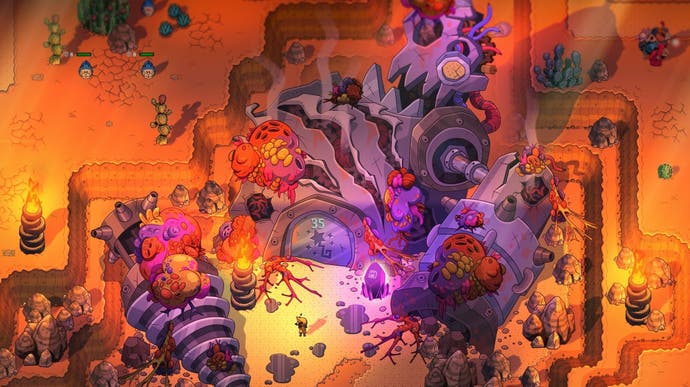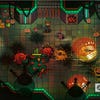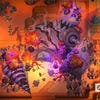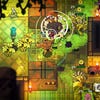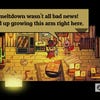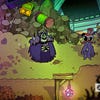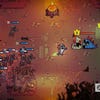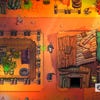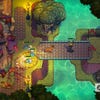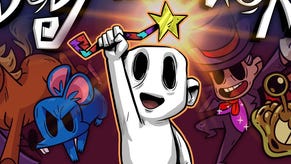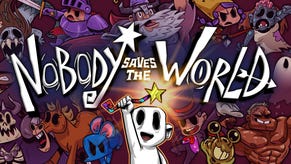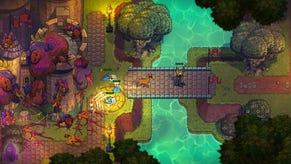Drinkbox's Nobody Saves the World has all the lurid zip and levity of Guacamelee, with an RPG twist
Packs a pun.
There's a kind of innocence to some humour, an innocence it needs in order to work. You realise this when you think about Guacamelee, Drinkbox's breakout PS Vita hit - a game with these strange things called "memes" in it, a game named with a pun. I feel like we probably wouldn't enjoy a game with memes in it in 2021 - they're familiar now and sort of oddly important, and so you lose the innocence. But Drinkbox has kept the innocence elsewhere with Nobody Saves the World. It's another silly, but also seemingly very good, game that's built on humour first and clever evolution of genre just behind it, and another game named with a pun.
You play as someone called Nobody in Nobody Saves the World, which drops the wrestling metroidvania costume of Guacamelee (barring a few familiarly chicken-sized tunnels) for the fantastical cloak of a dungeon-crawling action RPG. It's not the genre I expected, after battering my way through Guacamelee, but it's a result of the studio wanting to keep "engaged and creative," as lead designer Ian Campbell put it, and the result is a game that feels the same: energetic and zippy and full of snap.
There are small twists on the genre. The first is that Nobody Saves the World is built around switching "forms" on the fly. Nobody is a blank and comically useless canvas of a character who nabs a special wand, the waving of which allows you to transform into one of what Campbell says is 17 or 18 forms available for the moment ("we're trying to do more but that's what we have right now"), each a little ridiculous and purposefully "non-standard". I took on my first dungeon as a rat, for instance, with some poison-y, gnawing attacks, and then unlocked a fairly run-of-the-mill ranger, followed by an odd, much less run-of-the-mill magician that summons rabbit familiars and jabs people with a fan of cards. There's a horse, and so on (I am not selling this as laugh-out-loud, I'm aware! But sometimes humour is simply levity, and Drinkbox has a magically light touch).

The ARPG side of things is traditional, at first glance, asking you to progress across the overworld by crashing through its separate dungeons, but Drinkbox's spin is that you complete little objectives or quests, however, as opposed to grinding. In practise this doesn't feel hugely different - you gnaw your way through X number of enemies, clear a big dungeon, or summon Y magic rabbits and that grants you some points with which you unlock more characters, more skills, and so on (including the "stars" required to progress to new parts of the overworld) but the actual process is still the same: do more playing, get more things.
But the playing is fun! And the process is part of it, feeding into that lovely, moreish, virtuous RPG cycle. Each character has their one set of skills and passives that complement one another (a rat-nibble also poisons, another ability detonates anything poisoned), but later on you gain the ability to mix and match. This combines with enemies that start to gain shields, or "wards", that require specific types of damage - dark, explosive, etc. - before they're vulnerable to damage of any other kind, and now you have to think. Dungeons warn you of what kind of wards lie ahead, and so you might decide to stick the nibbling of the rat on your ranger, or couple the ability to summon rabbits with whatever it is you do with the horse.
Beyond the silliness, obviously, this is about systems: proper synergy and min-maxing and all the joyfully life-consuming things that come with a proper ARPG. Sticking to the Magician, for instance, there's an ability that lets you sacrifice one of your familiars for an attack boost, and an ability that makes them explode on low health or death, and one that heals them as they deal damage - so you can summon and then blow up a rabbit to deal damage, get a damage boost, which gives the rest a healing boost, and so on. All of this feeds back into the cycle of unlocks and quest completions and progression, back to summoning animals and blowing them up.
There are some quirks that take getting used to - the game's greatest challenge was its control scheme, I found, where you attack the way you're facing, but control the way you face with movement, which means you need to hold one of the triggers to strafe as opposed to just, strafing - but this may just be me, and Drinkbox's flair remains. It's pacy and fluid, slick, but light. It's great, and a good example of what this studio's all about. A layer of loveable goof, at ground level, that soon gives way to a much deeper well of combat, and systems, and a quiet mastery of genre.
